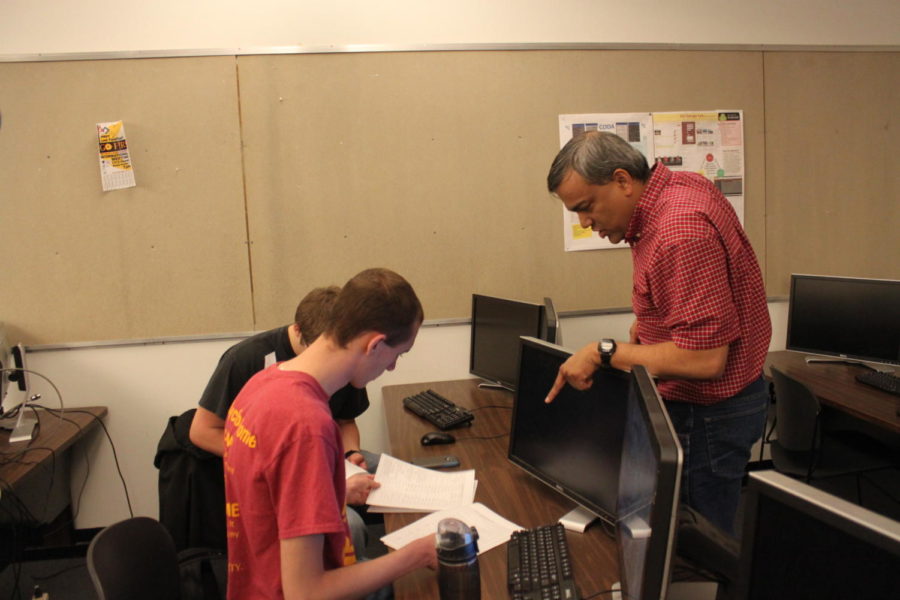Iowa State one of 128 teams to compete in worldwide computer programming contest
Senior lecturer Simanta Mitra coaches team members Tyler Uhlenkamp, senior in software engineering, and Jacob Smith, freshman in software engineering, for a computer programming contest. The team will travel to Marrakech, Morocco to compete against 127 teams from around the world.
May 11, 2015
Marrakech, Morocco, will be the site of a worldwide collegiate computer programming contest, where teams’ problem solving skills will be put to the test.
The 39th annual International Collegiate Programming Contest will host 128 college teams from around the world, including a team from Iowa State.
“This competition is like programming without all the boring parts,” said ISU team member Tyler Uhlenkamp, senior in software engineering.
Uhlenkamp said he was excited to compete for a second year at the International Collegiate Programming Contest “Battle of the Brains” competition. He said the problems provided for participants to solve are “pure programming,” something he takes pleasure in working with.
“It will be a big cultural experience,” Uhlenkamp said. He has been to Russia for another competition and is excited to experience Morocco.
Uhlenkamp’s two teammates, Trevor Boone and Jacob Smith, are also software engineering students. Boone is a senior and Smith is a freshman. Simanta Mitra, senior lecturer in the computer science department at Iowa State, will be the team’s coach.
Mitra said he is excited to coach the ISU International Collegiate Programming Contest team for his eighth year.
“I don’t think of this [ICPC competition] as a computer science thing, I think of it as a university thing,” Mitra said. He said he was happy the university and computer science department were willing to give support to the ISU team.
Mitra said selecting the three final team members can be a long process. The team going to the world finals in Morocco is one of a handful of computer programming teams at Iowa State, many of which compete in nearby regional tournaments.
The finalist team members are selected after going through several challenges and trials to test their programming skills and show their knowledge. Some challenges are individual and others are group challenges.
Uhlenkamp, who competed on Mitra’s team last year, had to requalify for this year’s team.
Mitra said this year’s team works very well together and is not afraid to ask for help with problem solving from himself or teammates
“These guys are humble, friendly and helpful,” Mitra said.
He said he enjoys watching the team bonding on trips home from regional competitions, as members talk about various problems they had and bounce ideas off one another.
“The team has become such good friends,” Mitra said.
The International Collegiate Programming Contest has the teams solve eight to 12 computer programming problems with algorithms. These algorithms are put into the computer after teams decide which one to use and how to use it, and the members hope the problem is solved.
The programming solutions are then tested. If they do not work or if they work too slowly, the team is given a time penalty. The team that solves the most problems by the end of the given time wins. If a tie occurs, the fastest problem solvers from the two teams is declared the winner.
Uhlenkamp and Mitra said the most frustrating part of the process is the judges not saying what exactly is wrong with the program.
“Basically, your feedback is one of three types: correct, incorrect or time limit,” Uhlenkamp said. He said the teams get a day of “practice problems” as a warm-up to the actual competition.
Mitra said all team members will probably have very good job opportunities. Instead of having to go on job hunts, the competitors often receive job offers at places like Google, Microsoft and IBM.
Uhlenkamp has already worked as an intern for Microsoft in Seattle, Wash. He plans to do data analytics during the summer for Palatin Technologies.
The International Collegiate Programming Contest is sponsored by IBM and is managed by the Association for Computing Machinery. The “Battle of the Brains” programming competition and related events will take place May 16 to 20 in Marrakech, Morocco.







